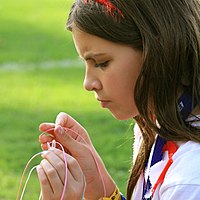
The relationship between schizotypal traits and satisfaction with life among Chinese young adults: The mediating effect of trait anxiety and mind wandering.
Sign Up to like & getrecommendations! Published in 2022 at "PsyCh journal"
DOI: 10.1002/pchj.531
Abstract: Schizotypal traits have been found to be negatively associated with satisfaction with life but the underlying mechanisms are not well understood. This study investigated the association between schizotypal traits and satisfaction with life and explored… read more here.
Keywords: satisfaction life; mind wandering; trait; life ... See more keywords

Increasing participant motivation reduces rates of intentional and unintentional mind wandering
Sign Up to like & getrecommendations! Published in 2019 at "Psychological Research"
DOI: 10.1007/s00426-017-0914-2
Abstract: We explored the possibility that increasing participants’ motivation to perform well on a focal task can reduce mind wandering. Participants completed a sustained-attention task either with standard instructions (normal motivation), or with instructions informing them… read more here.
Keywords: mind wandering; intentional unintentional; unintentional mind; increasing participant ... See more keywords

Space–time interaction: visuo-spatial processing affects the temporal focus of mind wandering
Sign Up to like & getrecommendations! Published in 2019 at "Psychological Research"
DOI: 10.1007/s00426-018-1080-x
Abstract: Our understanding of mind wandering (MW) has dramatically increased over the past decade. Studies have shown that in the vast majority of cases, MW is directed to times other than the present, and a bias… read more here.
Keywords: processing; time; orienting attention; mind wandering ... See more keywords

Individual differences in dimensions of mind wandering: the mediating role of emotional valence and intentionality.
Sign Up to like & getrecommendations! Published in 2021 at "Psychological research"
DOI: 10.1007/s00426-021-01579-2
Abstract: Individual differences in executive control ability reliably show that those with greater executive control report fewer instances of mind wandering during moderately demanding tasks. However, these findings have been limited in that they often treated… read more here.
Keywords: individual differences; valence intentionality; mind wandering; emotional valence ... See more keywords

fNIRS-based classification of mind-wandering with personalized window selection for multimodal learning interfaces
Sign Up to like & getrecommendations! Published in 2020 at "Journal on Multimodal User Interfaces"
DOI: 10.1007/s12193-020-00325-z
Abstract: Automatic detection of an individual’s mind-wandering state has implications for designing and evaluating engaging and effective learning interfaces. While it is difficult to differentiate whether an individual is mind-wandering or focusing on the task only… read more here.
Keywords: classification; window selection; learning interfaces; mind wandering ... See more keywords

Effects of the Mindfulness-Based Stress Reduction Program on Mind Wandering and Dispositional Mindfulness Facets
Sign Up to like & getrecommendations! Published in 2018 at "Mindfulness"
DOI: 10.1007/s12671-018-1070-5
Abstract: Mind wandering is characterized by the absence of cognitive focus on a task, due to interfering spontaneous mentation. Despite a large number of investigations on mind wandering and mindfulness training in recent years, very few… read more here.
Keywords: mindfulness; reduction; effects mindfulness; dispositional mindfulness ... See more keywords

How to prevent mind-wandering during an EVA ? Presentation of a mind-wandering detection method using ECG technology in a Mars-analog environment
Sign Up to like & getrecommendations! Published in 2017 at "Acta Astronautica"
DOI: 10.1016/j.actaastro.2017.08.008
Abstract: Abstract The purpose of this study is to detect mind-wandering in an Extra-Vehicular Activity (EVA) context during a long supervision task. Detection is realized using an electro-cardiogram and measures of heart rate variability. Experienced by… read more here.
Keywords: mind; detection; mars analog; method ... See more keywords

Drowsiness or mind-wandering? Fluctuations in ocular parameters during attentional lapses
Sign Up to like & getrecommendations! Published in 2020 at "Biological Psychology"
DOI: 10.1016/j.biopsycho.2020.107950
Abstract: Two independent lines of evidence suggest that drowsiness and mind-wandering share common neurocognitive processes indexed by ocular parameters (e.g., eyeblink frequency and pupil dynamics). Mind-wandering and drowsiness frequently co-occur, however, such that it remains unclear… read more here.
Keywords: attentional lapses; ocular parameters; oculometric variations; drowsiness mind ... See more keywords

The influence of time on task on mind wandering and visual working memory
Sign Up to like & getrecommendations! Published in 2017 at "Cognition"
DOI: 10.1016/j.cognition.2017.08.006
Abstract: Working memory relies on executive resources for successful task performance, with higher demands necessitating greater resource engagement. In addition to mnemonic demands, prior studies suggest that internal sources of distraction, such as mind wandering (i.e.,… read more here.
Keywords: time task; working memory; task; mind wandering ... See more keywords

Language facilitates introspection: Verbal mind-wandering has privileged access to consciousness
Sign Up to like & getrecommendations! Published in 2017 at "Consciousness and Cognition"
DOI: 10.1016/j.concog.2017.01.002
Abstract: Introspection and language are the cognitive prides of humankind, but their interactions in healthy cognition remain unclear. Episodes of mind-wandering, where personal thoughts often go unnoticed for some time before being introspected, offer a unique… read more here.
Keywords: mind; consciousness; mind wandering; facilitates introspection ... See more keywords

The role of task difficulty in theoretical accounts of mind wandering
Sign Up to like & getrecommendations! Published in 2018 at "Consciousness and Cognition"
DOI: 10.1016/j.concog.2018.08.005
Abstract: Recent research has indicated that reducing the difficulty of a task by increasing the predictability of critical stimuli produces increases in intentional mind wandering, but, contrary to theoretical expectations, decreases in unintentional mind wandering. Here,… read more here.
Keywords: theoretical accounts; task difficulty; task; mind wandering ... See more keywords